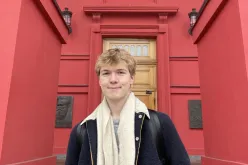Meet Adrien Olszak-Olszewski, a UN Volunteer from Switzerland working as an Education Analyst with the World Bank in Kyiv, Ukraine. His assignment is funded by Swiss State Secretariat for Economic Affairs (SECO). Serving as a UN Volunteer with the World Bank enables Adrien to have a real impact on improving people's access to social services, infrastructure and jobs in Ukraine.
Throughout my studies, I became interested in the interplay between social policy and economic growth. Hence, I decided to focus on the provision of quality education and how education systems impact social and economic development, especially in the context of Europe and Central Asia.
Serving as a UN Volunteer with the World Bank in line with my values: it enables me to have a real impact on improving people's access to social services, infrastructure and good jobs, as well as empowering young people.
What does your day-to-day work involve?
I conduct research on education and human capital development in Ukraine. This information helps the Government of Ukraine and the World Bank with insights into the functioning of the Ukrainian education system and to better understand the impact of the pandemic.
I focus specifically on marginalized groups' access to quality education, both before and during the pandemic and the learning losses incurred during school closures. For instance, I compare the learning outcomes of different groups of students based on their family backgrounds.
It is very telling to find that children from lower-income households living in rural areas or coming from a national minority had significantly worse scores at national assessments than their peers. This is very much linked to the type of schools they attended and the nature of parental support they received.
My research provides initial insights into the impact of the COVID-19 pandemic on children in Ukraine. We estimate that, due to school closures, children from lower-income families lost the equivalent of a year of schooling compared to their better-off peers. We then design recommendations for the Government to improve equity in education, offset the COVID-19 crisis closures on students' performances, and finally integrate lessons learned from the pandemic in future education reforms.
Another key area of our research is the resilience of the education sector in Ukraine in the face of climate change. As Ukraine pledged to reduce its greenhouse gas emissions by 65 percent compared to 1990 levels by 2030, it is essential to modernize the education system. This means better preparing the future workforce for green jobs and retraining current workers to ensure that they can move from declining and polluting industries to new sectors.
As a UN Volunteer, I identify weaknesses of the Ukrainian education system, mainly related to the quality of education, and provide recommendations for policymakers at the central, regional and local levels. This includes improvements to career guidance at the high school level to increase students' enrollment in STEM programmes, especially for girls, or designing retraining programmes for laid-off workers to help them build on their existing skills to find new employment in the green economy.
Lastly, I support the launch and the implementation of the Ukraine Improving Higher Education for Results Project, which aims to back the Government's efforts to strengthen efficiency, quality and transparency of the higher education sector in Ukraine over five years. This includes investment in the modernization of digital learning infrastructure as well as teaching and research facilities of higher education institutions.
To support these efforts, I work on a communication campaign and conduct background research to provide insights on implementing such reforms in other European countries.
Lessons learnt from the volunteer work
Being a UN Volunteer with the World Bank has been a very enriching experience with many opportunities to learn. It not only enabled me to specialize further in education policy but also provided me with in-depth knowledge about the Ukrainian education system.
Through my UN Volunteer experience, I now can better understand international project management. Following and participating in discussions with the Ministry of Education and Science of Ukraine and other relevant stakeholders enabled me to understand how the World Bank and other international organizations coordinate with different national stakeholders.
Being a UN Volunteer is a once in a lifetime opportunity. While it provides an excellent professional experience within an international organization, it is primarily a life experience. Moving to a country of operation and following the progress of the projects from the ground changes one's perceptions of international development. It breaks barriers and truly expands your horizons.
The SECO-UNV Full Funding (FF) Programme is designed to allow talented Swiss citizens to build capacities, develop skills and contribute to peace and development through their international UNV assignments within the World Bank. In 2021, 10 were funded by SECO.

